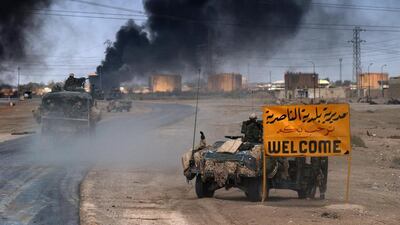In US presidential politics it is axiomatic that, in the end, domestic issues such as the economy and health care determine elections. This held true during Barack Obama’s re-election bid in 2012 when these concerns were the crux of the campaign, and turmoil in the Middle East had become a more distant concern for both candidates and the electorate.
But in the current presidential election cycle — so far at least — foreign policy has dominated campaign rhetoric and posturing as ISIL extremists carried out a string of successful terrorist attacks and Syrian refugees continue to inundate Europe.
Recent polls have shown that security and foreign policy are as important to voters as economic issues, and is the overriding concern for Republican voters.
The large field of Republican candidates tried to differentiate themselves from one another while attracting the support of the party base — and highly ideological major donors — before and during this year’s primaries, mostly by promising a far more aggressive strategy against ISIL.
The two Republican front runners – Donald Trump and Ted Cruz – have both promised as much, though in place of policy details they have provided a barrage of outrageous rhetoric.
In part, the foreign policy focus is due to the relatively strong economic growth during Mr Obama’s second term and the popularity of his health care law. With the continuing strength of ISIL despite a year of US-led air strikes, and a more assertive Russia and China on the world stage, they are seeking to exploit growing perceptions that he has mishandled these issues and is dangerously risk averse — and by extension both the Democratic candidates.
George W Bush’s disastrous invasion of Iraq badly dented Republican credibility on foreign policy and defence issues the conservative party had traditionally dominated, but there is now an opening for the party’s candidates to regain its edge.
A more fundamental dynamic underlying the campaigns is the ebb and flow of the US role in the world. “Our foreign policy unfolds in cycles of soaring ambition followed by sober retrenchment, and Obama was a president who pursued retrenchment” after two costly and inconclusive wars he promised to end, said former Michael Armacost, a former US ambassador to Japan now at Stanford, and author of the recent book, Ballots, Bullets, and Bargains: American Foreign Policy and Presidential Elections.
The focus on multilateralism and “not doing stupid stuff”, as Mr Obama has put his foreign policy mantra of the past eight years, has begun to be less popular with a war-weary US public as global threats appear to multiply.
“If retrenchment looks like weakness and retreat, at that point I think the general public gets a little anxious about American strength and they’re more interested in assertiveness,” Mr Armacost said. “And so we’re in one of those periods where the mood shifts.”
Mr Obama has indeed shifted tactics in response to criticism, escalating incrementally, and has now sent around 5,000 US ground forces to the fight against ISIL in Iraq and Syria. However, Republican and even Democratic campaign rhetoric will likely ignore or downplay these moves, much in the way Mr Obama himself campaigned against Mr Bush’s first-term war policies but largely continued the strategy Mr Bush put in place late in his tenure.
“Most candidates wish to run as agents of change so it’s in their interests to portray the existing administration managed by the other party reflecting a poor diagnosis of the problems abroad, and a poor job of advancing American interests,” Mr Armacost said.
However the candidates slice it, there is still little appetite for drastic escalation involving a major troop deployment or occupation of territory, and the next administration’s policies may not look much different than Mr Obama’s, particularly in Iraq and Syria.
The campaigns so far have revealed very little about the details of any shifts in policy towards ISIL, the US role in the Middle East or confronting Russia, and have focused on bombastic rhetoric and pledges that seem unlikely to be fulfilled in office. Mr Trump and Mr Cruz have taken positions that diverge sharply from mainstream Republican foreign policy orthodoxy, such as when Mr Trump praised Russian president Vladimir Putin.
It is unusual that the leading candidates this far into a presidential election cycle are party outsiders. Normally, candidates work to demonstrate that they have mastered the party’s foreign policy framework and shown they can appear convincingly as commander-in-chief, and then during the general election move toward the centre to appeal to the largest number of voters. But the angry mood among the party’s base — particularly poor, uneducated whites who feel increasingly alienated — has allowed the foreign policy positions of the Republican candidates to remain unpredictable and outside previously acceptable boundaries.
It is likely that Republican nomination will not be decided until the party’s convention in July, when the two candidates will have to try and convince delegates behind closed doors. Their positions could grow even more extreme as they try to outflank each other to the right, or moderate as they try to win the support of party establishment “super-delegates”.
Regardless of who ends up on the party ticket, the eventual candidate will almost certainly pivot towards the centre during the general election campaign. However, because the candidates have gone so far to the right on many issues, it is unclear if they will be able to pivot without alienating their base constituencies. Or, perhaps, the long campaign cycle full of virulent Islamophobia and previously beyond-the-pale foreign policy ideas has normalised these positions and made them more palatable for a greater proportion of the electorate.
tkhan@thenational.ae

